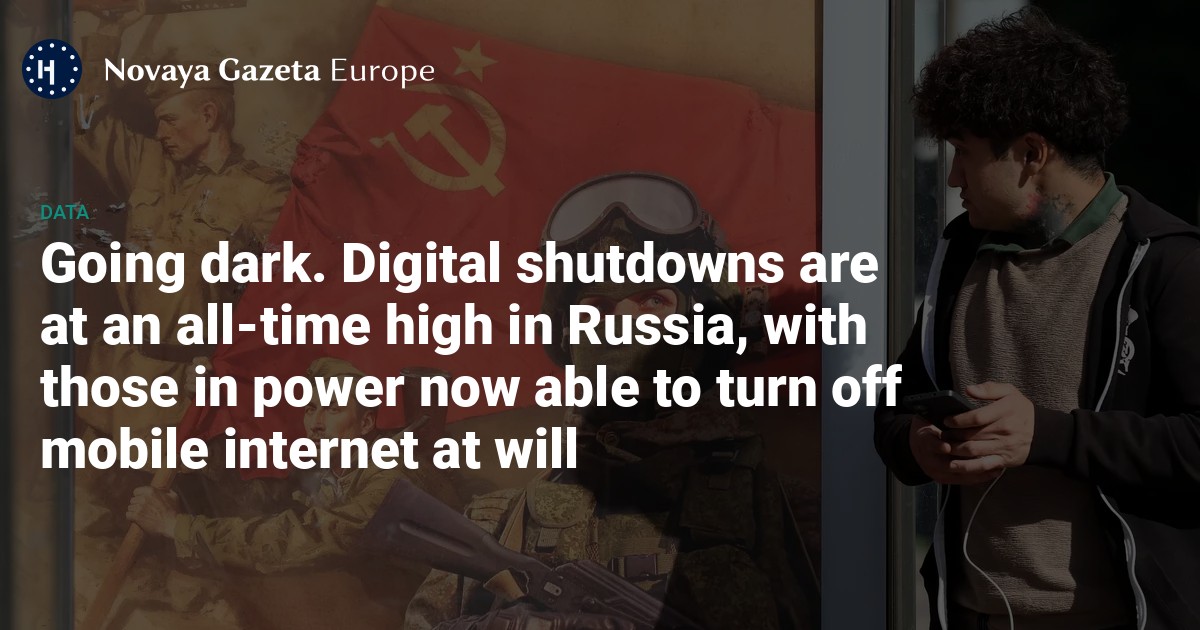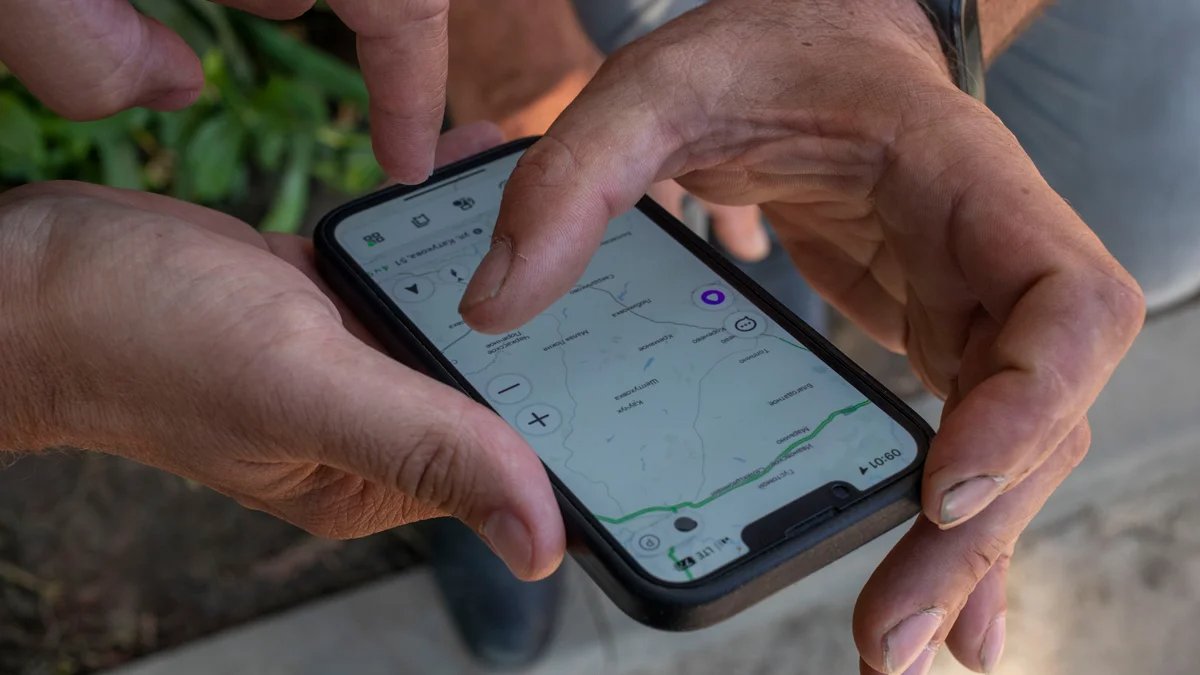



Russia appears to have found a radical new tool against Ukrainian drone attacks: widespread mobile internet blackouts that have cost the economy millions and, in some cases, endangered its own citizens.
Many Russians began experiencing widespread, if short-term, internet and cellular data outages for the first time in early May, most notably when the annual Victory Day parade celebrations in Moscow were accompanied by intentional mobile service blackouts across the city.
Then, the problem got worse. From the start of June and throughout July, according to the Na Svyazi digital monitoring project, almost every Russian region was left without Internet or mobile coverage at least once. Some parts of the country had outages imposed nearly constantly throughout June and July, with central and southern Russia suffering the most severe impact.
Experts are not even sure that shutdowns are an effective way of stopping drone strikes.
These mass internet and cellular shutdowns, explained by the authorities as part of the fight against Ukrainian drones, can cost regional economies up to 750 million rubles (€8.2 million) per hour. They also deprive Russians of the ability to communicate, in some cases preventing them from escaping drone attacks.
Experts are not even sure that shutdowns are an effective way of stopping drone strikes. According to Sarkis Darbinyan, a digital rights lawyer, they’re more like “acts of desperation” on the part of regional authorities, last-ditch attempts to meet the Kremlin’s ever-increasing demands that Ukrainian attacks be stopped.

A woman uses her mobile phone. Photo: Novaya Gazeta Europe
Digital shutdowns in Russia have become so much more frequent and intense that the country can essentially no longer be compared with the rest of the world.
According to data from Access Now, a digital rights NGO, there were 296 digital shutdowns globally in 2024, with Russia’s 13 putting it fourth in the world rankings after Myanmar (85), India (84) and Pakistan (21). This year, in June alone, Russia had 655 internet, cellular data, and even landline communication shutdowns, particularly after Operation Spider’s Web, a long-planned coordinated Ukrainian attack which used mobile internet-guided drones to strike strategic air bases all across the country.
Little has changed so far in July, as outages continue daily across Russia. According to Na Svyazi, there was even a “partial national shutdown” at the start of the month, with all mobile internet providers simultaneously experiencing an outage, along with several messenger applications.
It is actually possible to knock drones off course and interfere with their video transmission by shutting down mobile internet service.
It is difficult to understand exactly why, and where, the shutdowns are being imposed, according to an analysis by independent news outlet Meduza. At times, they occur in regions where critical military infrastructure is located, such as central Russia’s Tula and Nizhny Novgorod regions, or the Russian Arctic region of Murmansk. But in the southwestern regions of Belgorod and Oryol, for example, located directly on and near the border with Ukraine, shutdowns have occurred less frequently than in far eastern Yakutia — over 5,000 kilometres from the fighting.
Questions also remain regarding when they occur. There is no correlation between whether shutdowns are imposed on weekends or weekdays: a record was set on 15 July, when communication problems were reported from 79 different Russian regions.
The official explanation given for Russia’s shutdowns is that it is a necessary measure when locations with “strategically important objects” come under attack from Ukrainian drones. That’s even the case for Kamchatka, Russia’s easternmost region, whose internet and mobile networks were temporarily shut down on 7 July in case of the “possible threat of drones”.
As journalists from Novaya Gazeta Europe, together with human rights NGO First Department, previously reported, it is actually possible to knock drones off course and interfere with their video transmission by shutting down mobile internet service. However, many drones can continue flying autonomously or via other communication methods.
Either way, digital shutdowns can deprive people of their ability to communicate or, sometimes, their chance to escape. On 1 July, for example, the Kupol Electromechanical Plant in the Volga region republic of Udmurtia came under attack. Shortly before the Ukrainian drones were launched, Russian authorities locked a wave of digital shutdowns. As a result, the factory’s alarm did not go off and no alerts were sounded. Without having received any prior notifications that they were in danger, factory workers and nearby residents simply did not have time to hide. Three people died.
As a result, people have resorted to employing new, analogue survival practices. These days, whenever residents of Krasivo, a village in the Belgorod region located 13 kilometres from Russia’s southwestern border with Ukraine, sense the danger of shelling, they sound the alarm by beating an old piece of railway track. The village has no wired internet nor analogue alarm system, so during wireless and mobile internet shutdowns residents are virtually cut off from the world.
According to Darbinyan, shutdowns in Russia are only going to get worse in the future: “It’s been clear since the four-day shutdown in Moscow and St. Petersburg on 9 May that other regions would follow suit; and that’s what we’re seeing now.”
Darbinyan explains that an instruction to shut down the Internet can come from either federal or regional authorities. Typically, local decisions are made in coordination with Roskomnadzor, Russia’s media and internet regulator, which is also occupied with a separate agenda — fulfilling instructions from Vladimir Putin to “throttle” American digital applications, Darbinyan told Novaya Europe.
“These shutdowns are truly hard to get around. Without the internet, almost all communication apps do not work.”
Technically, this is done by cutting off data transmission at the provider level, which effectively shuts down 4G, 3G, and all signal traffic. This is possible because, under Russian law, all mobile traffic must now pass through Deep Packet Inspection (DPI) devices, essentially traffic monitoring devices that Russia’s mobile network operators installed, but which Roskomnadzor has independent control of.
Additionally, telecom operators are required to provide Roskomnadzor with detailed technical information about their network, including which devices the traffic passes through, how it is routed, and who has access to it.
“These shutdowns are truly hard to get around. Without the internet, almost all communication apps do not work. Only a small number of programmes can function without mobile service using Wi-Fi and Bluetooth to transfer data between devices. But during a complete shutdown, communication is only possible via offline channels, such as walkie talkies, or more old-fashioned means — like optical telegraphy and signal fires,” Darbinyan said.
Alternatively, he added, mesh networks can be used, which function as internal networks allowing for devices in a single location to communicate with each other even without internet access. Rather than relying on a single central router, mesh networks consist of multiple interconnected nodes that relay data between devices, enabling seamless communication and automatic switching to the nearest active node if the primary one goes offline.

Photo: Novaya Gazeta Europe
Aside from the potential physical costs that can be incurred when communication fails, the frequency and intensity of Russia’s digital shutdowns are costing the country’s economy enormously. According to the Internet Protection Society, an anti-censorship nonprofit organisation, just one hour of internet and mobile network shutdowns can cost regional economies up to 750 million rubles (€8.2 million). Businesses across the country are suffering losses, and when everyday services or transactions fail, it can have serious social effects.
On 4 July, for example, in western Russia’s Tver region, a school bus driver physically assaulted a teenager after suspecting that she had not paid her fare. According to Telegram news channel Baza, the girl said that she had paid, but due to internet outages, the driver was not receiving a payment notification.
Russian authorities know perfectly well how much economic damage is being inflicted by digital shutdowns.
The shutdowns are “a natural continuation of the censorship and isolationist policy” that Russia has been implementing for the last 10–13 years,” Darbinyan noted.
Nevertheless, those measures wouldn’t have been implemented were it not for the “fear and hopelessness” of the regional authorities, who must report to the Kremlin on the measures taken to repel ever-increasing Ukrainian drone attacks. Russian authorities know perfectly well how much economic damage is being inflicted by digital shutdowns, Darbinyan told Novaya Europe. “But they don’t know what else to do.”
The Russian government has banned independent media. We were forced to leave our country in order to keep doing our job, telling our readers about what is going on Russia, Ukraine and Europe.
We will continue fighting against warfare and dictatorship. We believe that freedom of speech is the most efficient antidote against tyranny. Support us financially to help us fight for peace and freedom.
By clicking the Support button, you agree to the processing of your personal data.
To cancel a regular donation, please write to [email protected]
VPNovaya
Help Russians and Belarusians Access the Truth
